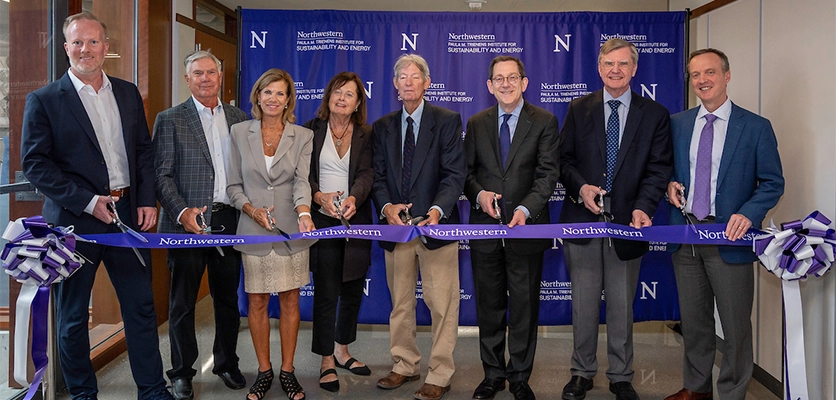In June 2023, the Trienens family generously bestowed $25 million to Northwestern to advance the University’s energy and sustainability research. The grant from the Howard and Paula Trienens Fund is the largest philanthropic contribution made to the institute, which was formerly known as the Institute for Sustainability and Energy at Northwestern (ISEN). University Trustee Nan Trienens Kaehler ’79 MS and Thomas R. “Kip” Trienens (’07 P) recommended the grant from the Trienens donor-advised fund.
“You are enabling us to not only continue work that has been going on at Northwestern for some time but to accelerate it and scale it and greatly increase its impact,” Eric Perreault, vice president for research, told the Trienens family at the dedication.
“This is a truly visionary gift that’s having a transformative impact at Northwestern as we speak in the area of sustainability and energy,” said Ted Sargent, the Lynn Hopton Davis and Greg Davis Professor of Chemistry, a professor of electrical and computer engineering, and co-executive director of the Trienens Institute.
The dedication ceremony opened with remarks from Northwestern President Michael H. Schill, who thanked the Trienens family for their enduring support of the University across programs and for their generosity now in this vital field.
“We endeavor, we hope, we aspire to be major thinkers, major actors in combating climate change,” he said. “Almost a year ago, I announced a series of academic priorities for the University, and decarbonization and sustainability were among the top areas of focus. The institute’s work also aligns with other University priorities like the biosciences, global studies, transformational opportunities presented to us by AI, and data analytics. And clearly, this gift is going to touch so many areas important to the University and the world.”
Trienens Kaehler shared reflections on her mother with attendees. “Paula was an incredibly beautiful, bright, curious, creative woman,” Trienens Kaehler said. “She had a love of all things nature and she had a special regard for the environment.”
Trienens Kaehler also talked about her mother’s legacy of taking action to support the environment through leadership in numerous area organizations, including Northwestern, and as a volunteer in her community. “My mother would be so proud to have her name on this building, and it is special to all of us,” she continued. “We are so thrilled about all of the incredible innovation and discovery that we all know will happen here.”
Perreault expanded on the groundbreaking work of the institute, both past and anticipated, noting that the institute is a longstanding part of the University research foundation and has made extensive contributions to the fields of sustainability and energy since it began as an initiative in 2013. “Without a doubt, one of our best University-wide institutes is the Trienens Institute,” he said.
In addition, Perreault acknowledged the longtime leadership of chemist Michael R. Wasielewski, founding director of the institute, sharing that under Wasielewski’s leadership, the institute has engaged more than 100 faculty across disciplines in energy and sustainability research and has created educational opportunities.
“Thank you for your scientific contributions, your creativity and innovation and your tremendous leadership,” said Perreault, who also highlighted Wasielewski’s expansive and continuing contributions to science, as Wasielewski looks toward a future focus in quantum science at Northwestern.
“We are really excited to continue to work with Mike, because Mike’s leadership in the quantum field is so important for this institution,” Sargent said. “There are so many ways in which the field of quantum and the field of the future of energy and sustainability dovetail and need to work together. It’s an exciting interdisciplinary area.”
Speaking to the room of attendees that included faculty, researchers, and staff, Sargent explained that he is eager to clarify and build on Northwestern’s existing areas of strength in sustainability and energy, focusing on decarbonization.
“We are incredibly grateful to our donors for their generosity in giving this gift,” Sargent said. “This has really asked us to rise to an incredible challenge. It’s exciting and it’s bracing, and we are all thrilled to have the chance to do it together. We are really seeking to have the kind of impact that I think we all dream that Northwestern can have.”
The Paula M. Trienens Institute for Sustainability and Energy is a vibrant part of Northwestern’s 35 University-wide research institutes and centers (URICs), which attract interdisciplinary talent from across schools and from more than 100 academic departments.
